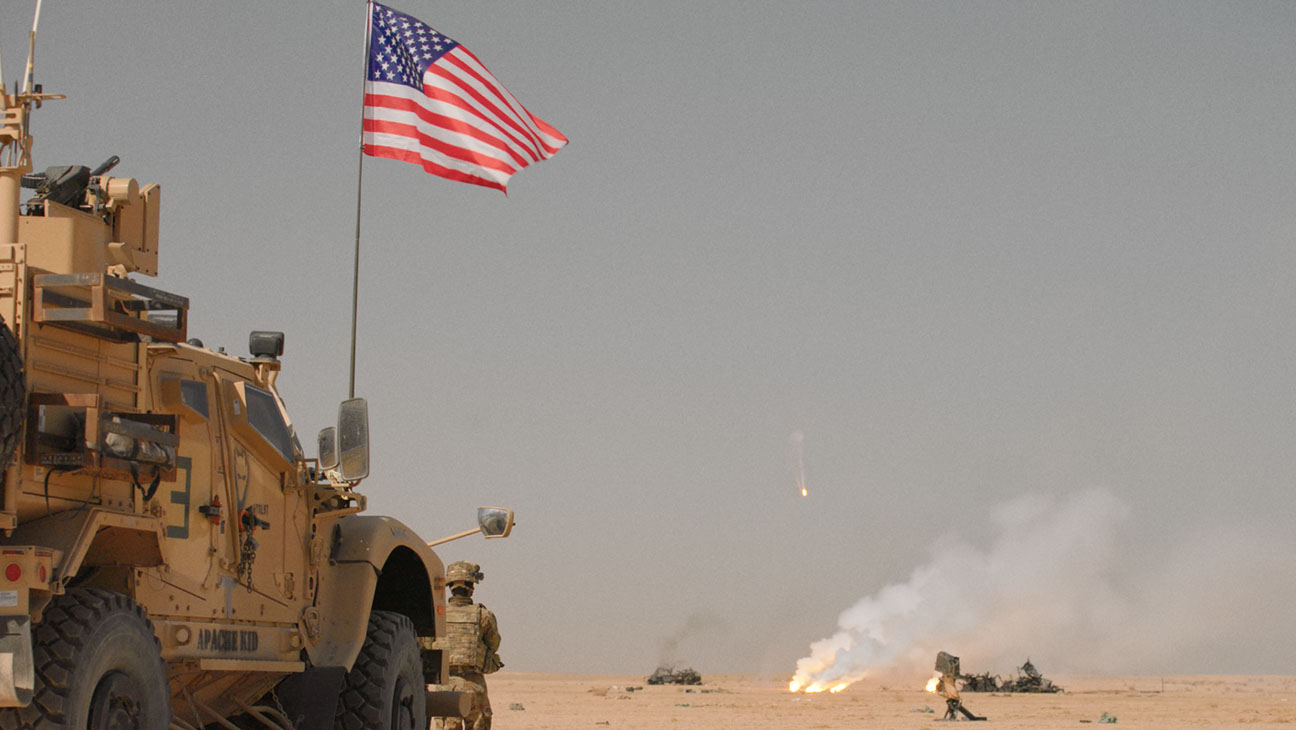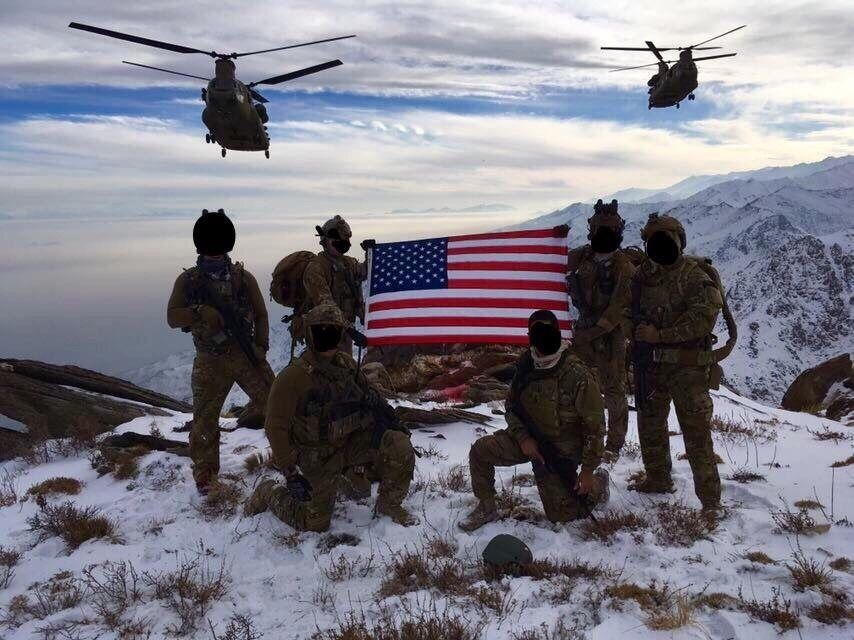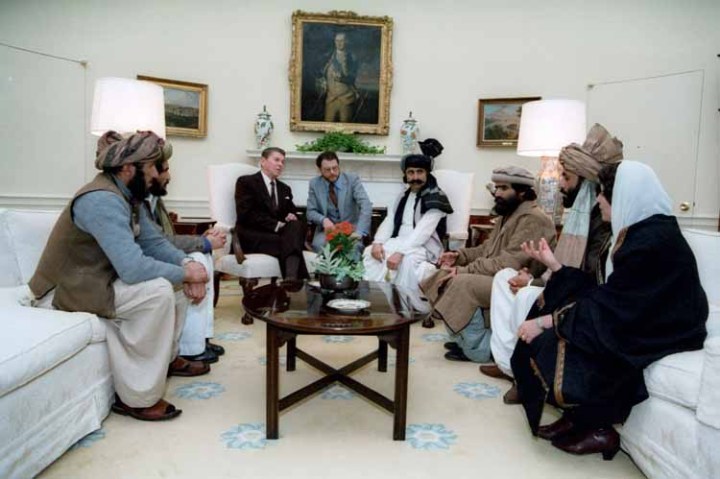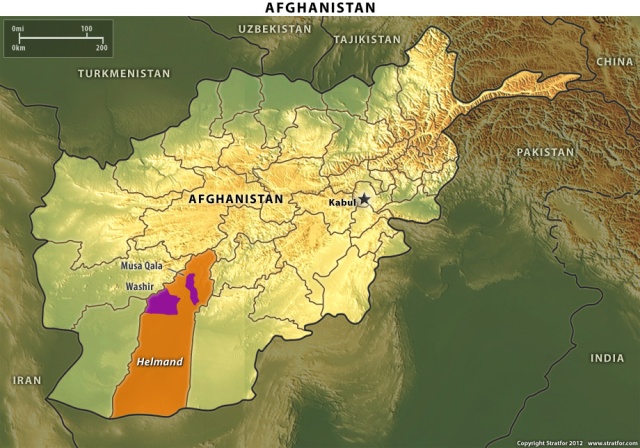
U.S. imperialism’s star-crossed 2001 invasion of Afghanistan and the ensuing 20-year occupation was doomed from the very start. Oscar-nominated and Emmy Award-winning director Matthew Heineman’s new 96-minute non-fiction film Retrograde documents the denouement of a deceitful debacle.
His film, shot on the ground often amidst intense combat, zooms in on the final nine months of what has been called “America’s longest war,” which gave birth to an unmitigated disaster and defeat for the ages for Washington.

Although Retrograde opens with images of mob scenes of desperate “wannabe” escapees at Kabul Airport in August 2021 and audio of President George W. Bush ballyhooing operation “Enduring Freedom,” followed by his three White House successors’ comments on the Afghan War, Heineman mostly eschews broader historical context for a “you-are-there” chronicle of the fight at the front lines, with lots of original war footage from the grunt’s point of view.
Watch a trailer of the film here.
Shooting original material (as opposed to largely utilizing archival vintage footage), the death-defying Heineman, who shares the cinematography credits and obtained incredible access (was he “embedded”?), delivers fly-on-the-wall combat photography offering a vivid sense of the unfolding carnage and its protagonist. Enhancing Retrograde’s cinéma vérité sensibility is drone and computer screen imagery.
At first, we are garrisoned with Green Berets at Camp Shorabak in Helmand Province, but instead of the formulaic focus on Western characters abroad with locals playing supporting roles as exotic backdrops (think Lawrence of Arabia), Heineman’s documentary quickly centers on their key local ally, General Sami Sadat, Commander of the Afghan Army’s 215th Corps.
Most of the Afghan soldiers and their Caucasian American counterparts are bearded, but Sadat is clean-shaven, sports sunglasses, speaks English well and is now 37 years old. According to the BBC, the polished general “was educated in London and many Western military academies.”

On-screen he says that, in the 1990s, his father fought in the resistance against the Taliban and was imprisoned by them. Much to Sadat’s surprise, his father survived and returned with an opposition army, liberating Kabul (presumably after the U.S.-led attack in 2001), which made a deep impression on his son.
When Sadat enters the scene in Retrograde in early 2021, he gives a rousing, morale-boosting address to his assembled troops at a military installation. There, U.S. special forces collaborate with the Afghans, training them in marksmanship, drone warfare, minesweeping and more. Inside a medical unit are wounded Afghan soldiers; one injured combatant gripes about “Taliban and al-Qaeda motherfuckers.” But despite the bonds forged on the ground, the camaraderie between the Americans and Afghans is short-lived, as the new U.S. president precipitously changes course.
In a news clip Joe Biden declares it “makes no sense to me” to continue down the path of the last two decades, which had been costly in blood and treasure. “Our diplomacy doesn’t hinge on boots on the ground,” insists Biden. Sadat muses: “It’s a strange and confusing time. The Americans trained me for years. I can’t imagine they’ll withdraw” after Washington’s enormous investment of $2 trillion and the deaths of at least 6,300 Yanks and 170,000 Afghans.
But orders are orders, and the Green Berets seem genuinely remorseful that they are leaving the Afghan “friendlies” in the lurch. They regretfully tell their local partners-in-arms that the troops on the ground “don’t make decisions,” as one soldier grouses, adding: “I’m not the president of the United States.” Another states, “It’s definitely an emotional thing for us. It’s tough leaving.”
Another U.S. soldier insists: “We share your frustrations…We haven’t given up on you.” Boohoo! That’s mighty “white” of you!
However, somehow the contrition of the special forces warriors does not stop them from carrying out Washington’s commands from on high, which includes destroying tons of ammunition and other equipment that the Afghans they are abandoning will soon desperately need. Better that the U.S. ammo—which the Afghan Army could put to good use—goes up in smoke, than take a chance that it falls into the hands of the advancing Taliban. Crocodile tears!
(Similarly, in late 2019, the Trump regime had also undercut the Afghan administration by leaving them out of negotiations regarding the course of the Afghan War. According to political analyst Juan Cole, “the U.S.-Taliban talks were criticized for being bilateral and for excluding the official government of Afghanistan, headed by Ashraf Ghani.”)

Retrograde does not go into the fact that, during the Carter-Reagan-Bush 1 administrations, the Afghans and their foreign allies the CIA covertly trained, armed and funded then eventually became, in turn-around-unfair play, the al-Qaeda and Taliban terrorists that the Yankees later attacked in 2001, seeking regime change. What peerless foresight our fearless leaders and decision-makers have!

Sadat is philosophical and ponders, “What did we achieve?” Nevertheless, contrary to the widespread belief that the entire Afghan Army threw down their arms and up their hands, Sadat soldiers on at the helm of a 15,000-man contingent in the face of the Taliban blitzkrieg. At a village rally, in one of the documentary’s rare reflective moments of explication, he describes what the anti-Taliban forces seek, citing among other things the rights for women to work and get educations. “This is a fight against totalitarianism for freedom,” Sadat asserts, admitting, “My family believes in the cause but they’re afraid they’ll lose me to the cause.”
The general fights back, trying to repulse the irresistible Taliban blitz, using drone warfare. When enemies struck by a missile go up in smoke, he quips that they have “been handed a ticket to hell.” According to the BBC, Sadat was “accused of ordering attacks which killed civilians. When questioned about the charges he denied them.” But come hell or high water, the Taliban offensive is unstoppable. The stalwart Sadat considers a counterattack, but it cannot be launched because his forces are short on ammo—which, as noted, the blithe American “allies” burned, undercutting their Afghan counterparts. (With friends like that…!) His troops are also running out of fuel, and morale is plummeting.
Astute readers may have noticed that I have not referenced the North Atlantic Treaty Organization (NATO) troops who also fought beside the Americans and Afghans. Indeed, they are virtually missing in action in Retrograde, and are only referred to (but never seen) once in passing by an Afghan soldier who notes “the withdrawal of the international forces.”
One of the telling takeaways from Heineman’s gripping film is that NATO’s participation in the Afghan War was subservient to Alpha dog Washington’s will and presence.
It is ironic that, to date, the only time NATO’s Article 5 collective defense agreement has been invoked was to fight on behalf of the Yankee Doodle Dandies, not a European member state of the military alliance wherein the U.S.A. is, but of course, first among “unequals” and the foremost, hegemonic, preeminent power in the coalition. (And but of course, the landlocked Asian nation is nowhere remotely near the North Atlantic, per se.)
Despite their lost cause, the forsaken Sadat and his 215th Corps comrades fight on alone from Lashkar Gah, the capital of Helmand province. I am not a shrink but it appears that the driven Sadat is in denial as the Taliban tide swiftly sweeps his homeland. “The last couple of months have taken a toll on me psychologically. With the U.S. forces gone… it wears me out,” he confesses. He refuses to watch images of a Taliban attack on an insistent officer’s cell phone and goes to the front lines helmet-less, as if he has a death wish, as bullets whiz by.

As the relentless Taliban march on, Afghan President Ashraf Ghani places Sadat in command of the country’s entire special forces. But, laments the general, “Then I got a call he [Ghani] fled the country.” The religious zealots overrun the capital, seize power and hold a meeting at the Kabul Polytechnic Institute with a number of their leaders. There, Muhammad Khalid Hanafi, who became Minister of Vice and Virtue, rails against Afghanistan’s enemies, including “elements trained by the Jews,” as well as foes in America and Europe.
The film ends as it begins, with extended scenes of throngs of frenzied Afghans mobbing Kabul Airport, desperately waving passports and visas, seeking flights to flee and get the hell out of Dodge, as Afghan soldiers fire warning shots.

ISIS’s bombing, killing 13 American soldiers and 170 Afghans at Hamid Karzai International Airport, is mentioned in passing in a title (the botched American response, we slaughtered Afghan innocents, somehow goes unmentioned). An overflow crowd is seen crammed like proverbial sardines on the floor of a military transport.
Matthew Heineman is a courageous, gifted filmmaker who tells his stories briskly and coherently. He co-won two Primetime Emmys in the Documentary Filmmaking and Cinematography categories and received an Academy award nomination for Cartel Land (2015), about the drug war along the U.S.-Mexico border.

The so-called “war on terror” is not new territory for Heineman, who also helmed the Emmy-nominated City of Ghosts (2017), about underground journalists clandestinely covering ISIS in Raqqa, Syria.


2018’s A Private War was a non-fiction biopic about famed eye patch-wearing combat correspondent Marie Colvin, who specialized in reporting on the Middle East.
As noted, Heineman’s scope in Retrograde is narrow: I do not recall the 9/11 aerial sneak attacks on the World Trade Center and Pentagon, which were the trigger or rationale for the U.S. invasion of Afghanistan, being mentioned once. If the long dead (by the time the onscreen action occurs) Osama bin Laden is even referred to by name, the al-Qaeda leader is certainly not dwelled upon.
This film never explains what the hell the Yanks were doing way down yonder in Afghan land, anyway.
At the end of the documentary, Sadat states, “I was sentenced to death by hanging,” and is, once again, betrayed by the Americans. “The U.S. refused to help so I went to the United Kingdom,” which had also sent troops to fight in Afghanistan. (So much for “leave no man behind”!)
This is the fate that will befall Native collaborators who are cast in the mold of Gunga Din or Tonto, as a 21st century sidekick to the omnipotent palefaces. In any case, Sadat vows to return someday to resist the Taliban again, just as his father did before him. Will Afghanistan’s freefall endure?

Despite its focus on General Sadat, Retrograde—which was nominated for the Critics Choice Documentary Awards in the Best Political Documentary category—suggests a number of other takeaways. The treachery and feckless capriciousness of U.S. imperialism is boundless.
When it comes to pursuing Washington’s geopolitical strategies, expediency is the name of the game, and just as yesterday’s enemies are, when it is convenient, today’s allies, contemporary partners are tomorrow’s discarded castaways, stranded whenever it is more opportune for the Pentagon and State Department to do so.
The Green Berets who express genuine guilt for leaving their Afghan comrades-in-arms high and dry when they are ordered to do so should learn the real lesson of U.S. realpolitik: Never, ever, under any circumstances should one place him/herself in harm’s way and voluntarily surrender his/her personal freedom by joining the military in order to make the world safe for imperialism.
And Third World people like Sadat can never trust Washington’s policymakers, who always speak with forked tongue. Treaties with America’s Indigenous tribes have generally been broken and Vietnam is still waiting until the cows come home to get the reparations promised to them many moons ago.
After 20 years and trillions of dollars and thousands of deaths in Afghanistan, America’s hollow vows in its “endless war” proved to be a bunch of infinite Kabul-shit. The imperialists are always wildly untrustworthy and unreliable – it is in their opportunistic, self-serving DNA.
Finally, Retrograde shows that U.S. imperialism and militarism are paper tigers. A ragtag group of religious fanatics gave Washington a colossal ass-kicking on an epic, Biblical scale, proving once again that the Pentagon can be beaten and resolutely defeated.

Retrograde was theatrically released in New York and Washington, D.C., on November 11 and opened in Los Angeles (at the AMC Sunset 5 and Laemmle NoHo), San Francisco, San Diego, and Colorado Springs on November 18. Retrograde airs on National Geographic Channel December 8 and is streaming on Disney+ on December 9 and on Hulu December 11.

CovertAction Magazine is made possible by subscriptions, orders and donations from readers like you.
Blow the Whistle on U.S. Imperialism
Click the whistle and donate
When you donate to CovertAction Magazine, you are supporting investigative journalism. Your contributions go directly to supporting the development, production, editing, and dissemination of the Magazine.
CovertAction Magazine does not receive corporate or government sponsorship. Yet, we hold a steadfast commitment to providing compensation for writers, editorial and technical support. Your support helps facilitate this compensation as well as increase the caliber of this work.
Please make a donation by clicking on the donate logo above and enter the amount and your credit or debit card information.
CovertAction Institute, Inc. (CAI) is a 501(c)(3) non-profit organization and your gift is tax-deductible for federal income purposes. CAI’s tax-exempt ID number is 87-2461683.
We sincerely thank you for your support.
Disclaimer: The contents of this article are the sole responsibility of the author(s). CovertAction Institute, Inc. (CAI), including its Board of Directors (BD), Editorial Board (EB), Advisory Board (AB), staff, volunteers and its projects (including CovertAction Magazine) are not responsible for any inaccurate or incorrect statement in this article. This article also does not necessarily represent the views the BD, the EB, the AB, staff, volunteers, or any members of its projects.
Differing viewpoints: CAM publishes articles with differing viewpoints in an effort to nurture vibrant debate and thoughtful critical analysis. Feel free to comment on the articles in the comment section and/or send your letters to the Editors, which we will publish in the Letters column.
Copyrighted Material: This web site may contain copyrighted material the use of which has not always been specifically authorized by the copyright owner. As a not-for-profit charitable organization incorporated in the State of New York, we are making such material available in an effort to advance the understanding of humanity’s problems and hopefully to help find solutions for those problems. We believe this constitutes a ‘fair use’ of any such copyrighted material as provided for in section 107 of the US Copyright Law. You can read more about ‘fair use’ and US Copyright Law at the Legal Information Institute of Cornell Law School.
Republishing: CovertAction Magazine (CAM) grants permission to cross-post CAM articles on not-for-profit community internet sites as long as the source is acknowledged together with a hyperlink to the original CovertAction Magazine article. Also, kindly let us know at info@CovertActionMagazine.com. For publication of CAM articles in print or other forms including commercial internet sites, contact: info@CovertActionMagazine.com.
By using this site, you agree to these terms above.
About the Author

Ed Rampell is an L.A.-based film historian and critic who also reviews culture, foreign affairs and current events.
Ed can be reached at edrampel@gte.net.











Interesting and informative article, but I wouldn’t related to American Imperialism. We must not forget Communist Soviet Union also invaded Afghanistan,
Good observation. You are not only observing what people say, but also what they don’t say.
Google pays $100 per hour. My last paycheck was $3500 working 40 hours a week online. My younger brother’s friend has been averaging 12000 for months now and he works about 30 hours a week. I can’t believe how easy it was once.
For more details visit this article.. http://dollermake94usa.pages.dev/